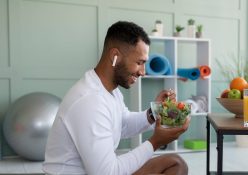Step away from the smoothie… Turns out, the foods we think are ‘healthy’ could be the reason your jeans are feeling a little tight. By Thandanani Mhlanga
 Reduced-fat peanut butter
Reduced-fat peanut butter
While the name says otherwise, this is not necessarily a healthier version of this beloved treat. In fact, the only thing you’re buying is peace of mind, with none of the actual benefits. Low-
fat peanut butter has more or less the same number of kilojoules as ordinary peanut butter, but it contains more sugar to compensate for its blander taste. Peanut butter is also a natural source of ‘good’ fat, so you’re better off with the original version.
Replace with natural peanut butter with no added oil. Alternatively, make your own at home.
Muesli
Many people think muesli is a healthy breakfast option, not surprising as it’s often marketed as such. But a lot of the muesli found at your local grocery shop are not doing you any weight-loss favours. Some brands contain as much as 2 000 kJ per serving, are high in fat and have tons of added sugar. And a high volume of oil in muesli is also not good for you.
Replace with home-made muesli (using oats, sunflower seeds, a small amount of dried fruit and nuts) and full-cream milk.
Low-fat yoghurt
Low-fat yoghurt is often marketed to dieters as a beneficial part of their weight-loss solution, when the truth is actually the opposite. By reducing the fat content, much of the yoghurt’s flavour is stripped away, leading to a heap of sugar being added for taste. Artificially sweetened yoghurt is not ideal, says dietitian Ashleigh Caradas, as it can also increase your cravings for sweet foods. Reduced-fat items are also worrying as they contain a laundry list of chemical ingredients. If you can’t pronounce it, you probably shouldn’t be eating it!
Replace with plain full-cream yoghurt flavoured with honey or vanilla.
Smoothies
To cut a long story short: if you’re buying smoothies over the counter, there’s no way of telling what added ingredients, colourants and artificial sweeteners are in there. Smoothies tend to have high amounts of fruit juice – itself sweetened – and can be a source of tons of ‘liquid kilojoules’, says Ashleigh. ‘When you drink your kilojoules, you don’t realise how much you’re consuming, in this case, in milk, yoghurt, fruit juice and who knows what else.’
Replace with your own smoothies. That way, you know what’s in it. Use plain yoghurt and frozen fruit, and add some flaxseed, which is a great source of omega-3 fatty acids.
Sushi
Here is one instance in which you control to what extent something is bad for you. Sushi can definitely be a healthy, weight-wise meal – that’s if you order correctly and in modest portions. Sushi eaters are prone to eating more than one serving, so it is important to regulate how much you eat in one sitting. Deep-fried or tempura rolls with sushi mayo, or any option that contains cream cheese, can rack up quite the kilojoule count. It’s also advisable to try limit your intake of soy sauce as it’s packed full of sodium, which can lead to bloating and has been linked to a higher risk
of stroke and cardiovascular disease.
Replace with steamed, grilled or raw options instead of fried. Ask for brown rice and a reduced-sodium soy sauce. Also, opt for sashimi over maki, for example, or have a selection to lessen your intake of rice.
Dried fruit
Did you know dried fruit, especially berries, commonly contains added sugar? Over time, the fruit’s natural flavour lessens, which is why sucrose is added. There’s simply no substitute for fresh fruit: some vitamins do not survive the drying process and the water in fresh fruit makes it that much more filling. ‘Dried fruit is deceptive in that if you eat a bag of dried mangos, there are easily six whole mangoes in there,’ says Ashleigh. Meaning you’re taking in a whole lot more sugar than you would if you ate fresh fruit.
Replace with fresh fruit and a handful of almonds.
Breakfast cereal
With a sea of adverts lauding their nutritional value, you’d be forgiven for thinking breakfast cereals are a healthy start to your morning. Sorry to break it to you, but this is not the case. Many cereals – especially the chocolatey ones your kids clamour for – contain preservatives, artificial flavouring and added sugar.
Also, while the vitamins added to cereals are good for you, remember that getting more than 100% of your recommended daily amount (RDA) is, at best, a waste of time and, at worst, harmful. So don’t settle for the sugary stuff just because it contains lots of vitamin A, for example.
Replace with a home-made brekkie with all natural ingredients. Oatmeal, yoghurt, a serving of fruit and eggs are all good options.
The right stuff
There’s no reason maintaining a healthy weight should be a problem if you feed your body good food that will nourish it –as well as exercise every day. Likely, it’s the foods you take little notice of, or even believe to be helping your weight-loss cause, that are to blame for not dropping the kilos.







